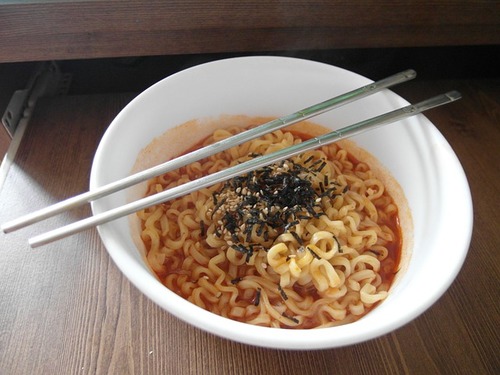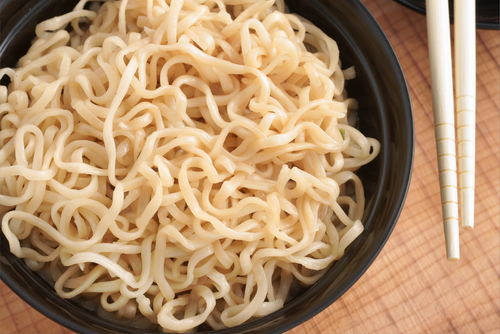Short answer
Ramen may be delicious but packs a sky-high sodium content and a whole mess of nasty preservatives.
Recommended Alternative
Long answer
How bad is ramen for you, exactly? A team of researchers from Harvard and Baylor University aimed to answer that question by surveying some 11,000 people from South Korea - the ramen capital of the world. They found dangerously elevated rates of metabolic syndrome in South Korean women. That means higher levels of cholesterol, higher blood pressure, and higher blood sugar. Over time, metabolic syndrome can lead to diabetes, heart disease, or stroke.
This might be connected to ramen's sky-high sodium content. A healthy adult maxes out on around 2300 mg of sodium a day; some shouldn't consume more than 1500 mg. A packet of Nong Shim Shin Ramyun - one of the nicer ramen brands on the market - has more than a thousand milligrams of sodium per serving. Eat ramen sparingly or you'll up your risk of hypertension, high blood pressure, and heart disease.
Some brands of ramen have monosodium glutamate, or MSG. Although it contributes to the astronomically high sodium content of ramen, it isn't as bad as you've been lead to believe - it won't kill off brain tissue, cause wild hormonal fluctuations, or bring on "Chinese restaurant syndrome" unless you inject it directly into your skin instead of eating it. Higher-end ramen brands will nonetheless often swap out MSG for flavoring agents like disodium guanylate and disodium inosinate. There's not much nutritional content to these salts, but they're not going to hurt you on their own.
Ramen is rich in preservatives. Some brands have tertiary butylhydroquinone, or TBHQ. It's not created from lighter fluid, as some sites claim, and it's approved by the European Food Safety Authority and the Food and Drug Administration for use in small quantities. It's also an additive that you'll want to limit your intake of - prolonged exposure to very high doses in animals causes stomach cancer and DNA damage. There's a whole range of TBHQ-like preservatives in different brands of ramen; like TBHQ, they're generally present in minuscule amounts that have been approved as safe. Treat these preservatives as signposts - in ramen and elsewhere, they mark foods that you should consume in moderation.
The flavoring and preservative agents in ramen make for long and hard-to-pronounce lists of ingredients. That's an indicator that most ramen brands are heavily processed. Processed foods are something that you should eat sparingly - they've got lower nutritional content in general and don't do a body much good. If you've read this far, you already know the lesson here: eat ramen sparingly. If you do eat it, buff it out with fresh ingredients - try adding green onions, leafy greens, cold cuts or eggs.
Possible short-term side effects
- headaches
- nausea
Possible long-term side effects
- metabolic syndrome
- high cholesterol
- high blood pressure
- high blood sugar
- diabetes
- heart disease
- stroke
Ingredients to be aware of
- sodium
- tbhq
- other hard-to-pronounce preservatives

Benefits
- cheap
- convenient
Our Wellness Pick (what is this?)
Organic Millet & Brown Rice Ramen
- Gluten-Free
- Quick to cook
- Healthy noodles
- Organic ingredients
- Rich in miso flavor
 Approved by
Approved by 















